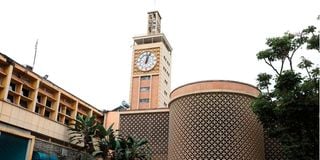Premium
Parliament budget office sees Sh300bn revenue target miss

A section of Parliament Buildings, Nairobi.
What you need to know:
- Parliamentary Budget Office indicates that development expenditure declined by Sh31.6 billion, which is 4.2 per cent from 10 per cent recorded in the same period in 2022.
- The PBO document shows that KRA missed its tax revenue collection target for the first quarter of the current financial year by Sh72.5 billion.
The office that advises Members of Parliament on budget planning has warned that the government will continue to face headwinds financing its development obligations as public debt hits Sh10.52 trillion by the end of August this year amid missed revenue targets.
The Parliamentary Budget Office (PBO) in its latest quarterly economic report warns that the situation might be worse in the coming days as it predicts Sh300 billion in missed revenue targets this fiscal year the current trend continues.
The PBO, using data from the National Treasury, indicates that development expenditure, which is critical in stimulating the country’s economic growth, declined by Sh31.6 billion, which is 4.2 per cent from 10 per cent recorded in the same period in 2022.
The net effect of this is that most government agencies received zero disbursements for development with money wired to the 47 devolved units averaging Sh61.1 billion, about 8.2 per cent, “the lowest since quarter one disbursement in 2021.”
Other than development, the document shows that ministerial recurrent expenditures in the first quarter of the current financial year- 2023/24- declined by Sh268.1 billion, about 36 per cent from 40.6 per cent in the same period last year.
The highest releases, Sh75 billion, were, however, towards the education sector specifically for the Teachers Service Commission (TSC) to cater for the payment of salaries of teachers and the agencies in charge of security matters.
With the country’s public debt on an upward trajectory, it is not clear how it will be financed in the wake of an unsteady performance by the Kenya Revenue Authority (KRA).
The PBO document shows that KRA missed its tax revenue collection target for the first quarter of the current financial year by Sh72.5 billion.
The first quarter target is set based on the annual tax revenue target of Sh2.57 trillion required to finance this financial year’s Sh3.6 trillion budget.
Although the revenue during the same period grew by 7.9 per cent from the previous year, PBO notes that it is a drop compared to an average of 13 per cent growth in previous years.
“If the performance rate follows the same trend for the rest of the fiscal year, then the annual target is likely to be missed by Sh300 billion,” the PBO document warns even as it attributes this to the delay in the implementation of the revenue-raising measures contained in the Finance Act 2023.
The document further indicates that all tax revenue categories as contained in the Finance Act, recorded below target performance for the period under review.
For instance, income tax missed its projections by Sh35.5 billion mainly due to below-target collection of taxes from employment Income- PAYE by Sh16.1 billion).
Consumption-based taxes also performed dismally falling short by Sh33.4 billion with VAT missing the target by Sh12.6 billion, excise duty by Sh12.5 billion, and import duty by Sh8.4 billion.
“Despite the shortfall, all revenue categories registered growth from the previous year except import duty, which declined by 1.6 per cent on the backdrop of shrinking imports.”
But even as this happened, the country’s economic revival looks volatile as public debt continues to escalate.
As of the end of August this year, the public debt stood at Sh10.52 trillion, which is Sh4.81 trillion in domestic debts and Sh5.71 trillion in foreign debts.





